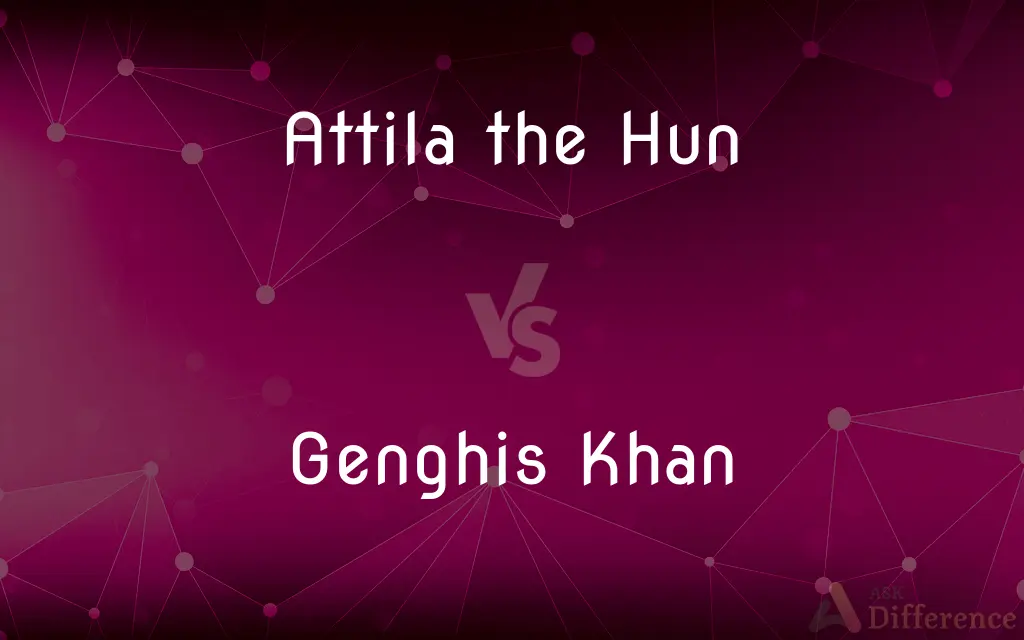Attila the Hun vs. Genghis Khan — What's the Difference?
By Tayyaba Rehman — Published on January 14, 2024
Attila the Hun was a 5th-century ruler of the Huns known for invading Roman Europe, while Genghis Khan was a 13th-century Mongol conqueror who founded the largest contiguous land empire in history.

Difference Between Attila the Hun and Genghis Khan
Table of Contents
ADVERTISEMENT
Key Differences
Attila the Hun was the ruler of the Hunnic Empire from 434 to 453 AD. Known as the Scourge of God, Attila led numerous campaigns against the Roman Empire, instilling fear across Western Europe. Genghis Khan, on the other hand, lived later, from c. 1162 to 1227 AD, and is renowned for unifying the Mongol tribes and establishing the Mongol Empire which eventually stretched from Eastern Europe to East Asia.
Attila the Hun's realm was vast, covering parts of modern-day Germany, Russia, and the Balkans, but it was not a centralized state like Genghis Khan's empire. Genghis Khan’s governance was characterized by a structured administration with laws known as Yassa, and his domain was formalized through conquests and diplomacy.
The military tactics of Attila the Hun were feared for their ferocity and effectiveness, particularly his use of heavy cavalry. Genghis Khan also revolutionized warfare but with an emphasis on mobility, using horse archers to execute complex maneuvers and adapting technology from conquered peoples.
Culturally, Attila the Hun is often depicted as a barbarian leader with a ruthless reputation in Western narratives, while Genghis Khan, despite his brutal military campaigns, is also credited with patronage of trade and the arts, influencing the cultural landscape of Asia. The legacy of Genghis Khan is seen in the vast cultural exchange facilitated by the Pax Mongolica, which Attila the Hun’s campaigns did not achieve.
Both Attila the Hun and Genghis Khan died without securing a lasting dynasty. Attila’s empire fragmented after his death due to internal conflict, whereas Genghis Khan’s empire was divided among his sons but continued to expand and influence under their rule, showing a difference in the legacy and structural solidity of their respective empires.
ADVERTISEMENT
Comparison Chart
Time Period
5th century AD
12th-13th century AD
Empire
Hunnic Empire
Mongol Empire
Conquest Area
Europe and parts of Western Asia
Eurasia, from Eastern Europe to Asia
Governance
Less structured, tribal leadership
Structured empire with legal code
Legacy
Division after death, short-lived
Lasting empire, cultural influence
Compare with Definitions
Attila the Hun
Leader of a nomadic confederation.
Under Attila the Hun, the Huns reached the peak of their power.
Genghis Khan
Influential in promoting cultural exchange.
The Silk Road flourished under Genghis Khan's reign.
Attila the Hun
His death led to the empire's decline.
The Hunnic Empire quickly fractured after Attila the Hun's death.
Genghis Khan
Implemented the Yassa, a code of law.
Genghis Khan's Yassa included laws that encouraged trade.
Attila the Hun
A ruler of the Huns who invaded Europe.
Attila the Hun was feared throughout the Roman Empire.
Genghis Khan
Founder of the Mongol Empire.
Genghis Khan united the Mongol tribes to form a powerful empire.
Attila the Hun
Known as the Scourge of God.
Attila the Hun was seen as a divine punishment by the Romans.
Genghis Khan
His descendants continued to expand the empire.
Genghis Khan's legacy was carried on by his sons and grandsons.
Attila the Hun
Notorious for his campaigns against Rome.
Attila the Hun's siege of Aquileia left the city in ruins.
Genghis Khan
Conqueror with a sophisticated military strategy.
The military success of Genghis Khan was due in part to his innovative tactics.
Common Curiosities
Did Genghis Khan have a lasting impact?
Yes, his empire influenced Eurasia long after his death.
Who was Attila the Hun?
Attila was the king of the Huns from 434-453 AD and invaded Roman territories.
What did Genghis Khan achieve?
He founded the Mongol Empire and created a legacy of Mongol dominance.
Where did Attila the Hun come from?
He was from Central Asia, leading the Huns who were nomadic people.
How did Genghis Khan's rule affect trade?
He significantly boosted trade, especially along the Silk Road.
Why is Attila the Hun often seen negatively?
His invasions of Europe were devastating, influencing his brutal portrayal.
Was Attila the Hun considered a great leader?
Opinions vary, but he was a feared leader who commanded vast territories.
What was Genghis Khan's real name?
His birth name was Temujin; he took the title Genghis Khan later.
Was Genghis Khan religiously tolerant?
Yes, he allowed religious freedom in his empire.
Did Genghis Khan value education and the arts?
Yes, he and his successors supported intellectual and cultural pursuits.
Did Attila the Hun have a code of law?
There's no specific code of law known like Genghis Khan's Yassa.
What made Attila the Hun's military effective?
His use of heavy cavalry and terror tactics were key factors.
What governance methods did Genghis Khan use?
He used a sophisticated administration with meritocratic appointments.
How do Attila the Hun and Genghis Khan compare as conquerors?
Both were formidable, but Genghis Khan's conquests had a more lasting impact.
How did Attila the Hun's death affect his empire?
His empire fragmented and quickly fell apart after his death.
Share Your Discovery

Previous Comparison
Sparkling Water vs. Soda Water
Next Comparison
PC Games vs. PlayStation GamesAuthor Spotlight
Written by
Tayyaba RehmanTayyaba Rehman is a distinguished writer, currently serving as a primary contributor to askdifference.com. As a researcher in semantics and etymology, Tayyaba's passion for the complexity of languages and their distinctions has found a perfect home on the platform. Tayyaba delves into the intricacies of language, distinguishing between commonly confused words and phrases, thereby providing clarity for readers worldwide.
















































